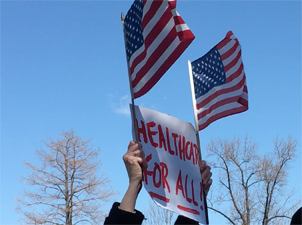
Texas v. Azar: One Court Ruling Could Affect the Lives of More Than 20 Million People
Anne Marie Bonds
October 9, 2019
Passed in 2010, the Affordable Care Act (ACA) was meant to decrease the number of uninsured people in the United States. Too many people simply hoped to stay healthy every day, avoiding hospitals and ambulances because they couldn’t afford thousands of dollars in medical bills. The ACA has made insurance accessible for over 20 million people since 2010 and has helped even more by making preventative care, such as annual physicals, free. It also prohibits all insurance companies from discriminating against people with pre-existing conditions, meaning people who are already sick cannot be rejected because of their illness.
For the last seven years, Republicans attempted to repeal the ACA numerous times through the legislative, executive, and judicial branches. In 2017, the repeal of the ACA came down to one vote in the Senate. Senator John McCain’s historic thumbs down vote effectively ended the Republican movement to repeal the ACA through legislation.
Now, the ACA is at risk again. This time, it is back in the courts. In February 2018, twenty Republican-led states filed a lawsuit, Texas v. Azar, to invalidate the ACA. Now, the lawsuit has made its way up to the 5th Circuit Court of Appeals, which is only one step down from the Supreme Court. The 5th Circuit is expected to make a ruling sometime this week, a decision that could potentially shake the nation’s entire health system.
If you know me you would probably ask: Anne Marie, why do you care so much about the Affordable Care Act? You’re an upper-middle class, 22-year-old white girl from Alabama. How has the ACA affected your life in any way? Well, the short answer is that it hasn’t. Not directly. I’ve been covered under my parents’ employer health insurance since I was young, and I’ve had the privilege of never needing to worry about how my medical bills were going to be paid. In fact, I never really cared about Obamacare until November of 2013, when I realized how the ACA impacts every single person in our nation.
In November of 2013, my father was diagnosed with ALS, or Lou Gehrig’s disease. It’s a terminal, degenerative disease that slowly atrophies muscle over time. Those with an ALS diagnosis have 3-5 years left to live, but for many, those years are not pleasant. Before my Dad got sick, he worked in an aluminum plant, and when he was diagnosed, he had to quit his job because he couldn’t lift anything anymore. Because of this, he lost his employer’s health insurance coverage, as many with ALS do.
Without the ACA, my father would not have been able to find private insurance, as insurance companies could have easily denied him due to his pre-existing condition. Thousands of ALS patients are dependent on this non-discrimination clause within the ACA to receive care that can prolong their lives for months. Without the ACA, ALS patients are left without a safety net and no way to pay for their care. Other people with chronic conditions, such as multiple sclerosis, fibromyalgia, and heart disease, depend on the ACA to protect them from private insurance discrimination. Although 20 million people directly depend on the ACA to provide them with quality, affordable health insurance, an innumerable amount of people in the U.S. depend on the ACA indirectly by prohibiting pre-existing condition discrimination and making preventative care services free.
Depending on how the 5th Circuit rules, there’s a good chance we’ll see this case in the Supreme Court next year. Although conservatives would have you believe the ACA only helps the uninsured, in reality, the positive effects of the ACA extend to almost every person in the nation. The ACA has faced a bevy of criticism for nine years, even though it is a vital aspect of our nation’s health care system. It is time to stop our partisan arguing over the ACA. It is time to stop making the health of our people an ideological argument. It is time to support the ACA and work to stop those who continue attempting to repeal and destroy it.







